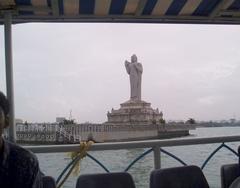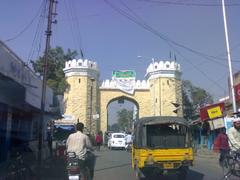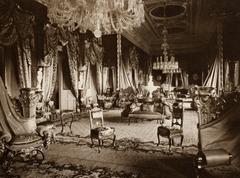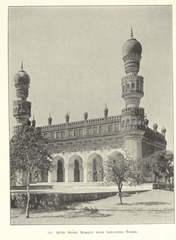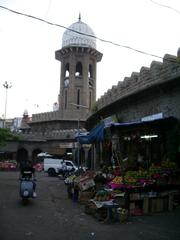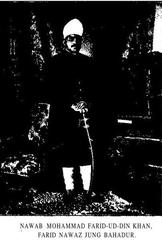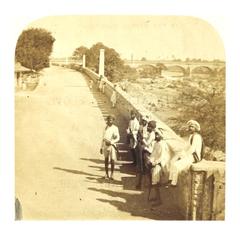St. George’s Church Hyderabad: Visiting Hours, Tickets, and Historical Guide
Date: 04/07/2025
Introduction
St. George’s Church, located in the heart of Hyderabad, is a monumental symbol of the city’s colonial legacy and religious diversity. As the oldest church in Hyderabad, it represents a unique confluence of British ecclesiastical architecture and the local cultural context. Established in the mid-19th century during the British Raj, the church not only stands as a heritage site but continues to serve as a vibrant center of worship and community life. This guide provides comprehensive details on visiting hours, ticket policies, accessibility, historical background, architectural features, and recommended nearby attractions. Whether you are a history enthusiast, architecture admirer, or spiritual seeker, St. George’s Church offers a profound experience of Hyderabad’s rich heritage.
For planning your visit and deeper insights, refer to resources such as Touristlink, Travenix, and Uniquely Telangana.
Location and Accessibility
St. George’s Church is situated at 4-1-1111, King Koti Road, Bogulkunta, Basheer Bagh, Hyderabad, Telangana 500001. The church’s central location in the King Koti/Abids area ensures easy access via public transport, including city buses, auto-rickshaws, and app-based cabs like Ola and Uber. Nampally Railway Station is about 2 kilometers away, while Rajiv Gandhi International Airport is roughly 30 kilometers from the church. The area is well-connected to iconic city landmarks and features nearby parking facilities, though public transport is recommended during busy hours (TravelTriangle).
Visiting Hours and Ticket Information
- General Visiting Hours: 9:00 AM to 5:00 PM daily.
- Sunday Services: Typically begin at 8:30 AM and last 2–2.5 hours.
- Special Services: Held during major Christian festivals such as Easter and Christmas.
- Entry Fee: Free for all visitors. No tickets are required. Voluntary donations are encouraged during special events or for church maintenance.
- Guided Tours: While the church does not offer formal guided tours, staff and congregation members are welcoming and often share insights. Local heritage guides can also be hired for a more in-depth experience (FabHotels).
Dress Code and Visitor Etiquette
Visitors are requested to dress modestly, covering shoulders and knees. Silence and reverence are expected inside the sanctuary—mobile phones should be on silent mode, and photography during services is discouraged. Permission should be sought for interior photography, especially during worship.
Accessibility
- Wheelchair Access: The main entrance and nave are at ground level, making most of the church accessible for differently-abled visitors. Some areas, like the vestry and choir loft, have steps and may require assistance.
- Facilities: Basic restrooms and drinking water are available. The church shares its compound with a school, but this does not hinder tourist access.
- Assistance: Staff are generally accommodating and willing to assist visitors with mobility challenges.
Historical Overview
Colonial Context and Foundation
Hyderabad’s strategic importance in the 18th and 19th centuries drew significant British involvement, particularly after the French withdrawal in 1758. The establishment of a British Resident at the Nizam’s court in 1779 marked the beginning of a lasting British presence, culminating in the need for a dedicated Anglican place of worship. In 1836, the Nizam granted land to the British community via a Firman-e-Mubarak, leading to the construction of Christ Church in 1844—the precursor to St. George’s Church (Touristlink).
Architectural Evolution and Anglican Heritage
Originally established as an Anglican church, St. George’s Church reflects the British colonial aesthetic: whitewashed walls, symmetrical proportions, and understated ornamentation. The structure follows the traditional Anglican plan with a nave, chancel, and sanctuary, and is oriented east-west. Local stone and lime mortar provide insulation, while timber trusses and arched windows ensure durability and natural ventilation (Travenix).
Transition to the Church of South India
After Indian independence, many Anglican churches, including St. George’s, transitioned to the Church of South India (CSI) in 1947—a uniting church comprising Anglican, Methodist, Congregational, Presbyterian, and Reformed traditions. This change marked a new chapter of inclusiveness and ecumenism (Touristlink). Today, St. George’s serves a diverse congregation, reflecting Hyderabad’s pluralistic ethos.
Architectural Features
- Neo-Gothic Design: Characterized by pointed arches, stained glass windows, and a dignified nave.
- Facade and Bell Tower: A simple portico with columns leads to a modest bell tower, which historically called parishioners to worship.
- Stained Glass: The church features three prominent stained glass windows above the altar, with the central window depicting the Ascension of Christ (Uniquely Telangana).
- Woodwork: Teak wood doors, original pews, and altar furnishings.
- Memorials: Plaques inside commemorate clergy, parishioners, and significant events, providing a tangible link to the past.
- Renovations: Preservation efforts include roof repairs, restoration of woodwork, and regular repainting to maintain the church’s historical integrity (Travenix).
Religious Services and Community Life
St. George’s Church remains an active center of worship, with regular English-language services on Sundays and special services during major festivals (Christmas, Easter, Palm Sunday). The congregation is diverse and welcoming, with activities including Sunday school, Bible study, youth fellowship, and community outreach.
- Major Festivals: Celebrated with processions, music, and decorations, particularly vibrant during Christmas and Easter (Uniquely Telangana).
- Community Initiatives: The church is involved in charity drives and cultural events, reinforcing its role as a community hub.
Cultural and Heritage Significance
St. George’s Church stands as a testament to Hyderabad’s history of religious tolerance and cosmopolitanism. Its establishment was facilitated by the Nizam’s support, and its continued existence reflects the city’s pluralistic spirit. The church is recognized as a heritage site and is frequently included in heritage walks and cultural tours (GPSmyCity).
Practical Tips for Visitors
- Best Time to Visit: October to March, when the weather is pleasant. Early mornings and late afternoons offer optimal lighting for photography and a peaceful atmosphere.
- Dress Appropriately: Modest attire is required; hats should be removed inside the nave.
- Photography: Allowed in exterior areas and with permission inside. Avoid flash and photographing worshippers during services.
- Facilities: Restrooms and drinking water are available. No on-site café, but many eateries are nearby in Abids.
- Safety: The church is in a safe, well-patrolled area. Standard safety precautions are advised.
- Language: Services are primarily in English; staff are generally fluent and helpful.
Nearby Attractions
St. George’s Church’s central location makes it a convenient starting point for exploring Hyderabad’s other heritage sites:
- Charminar: Iconic 16th-century monument, approximately 4 km away (Travenix)
- Mecca Masjid: One of India’s largest mosques, near Charminar
- Telangana State Archaeology Museum: About 2 km away
- Abids Shopping District: Known for colonial-era architecture and bustling markets
- Salar Jung Museum: Renowned collection of art and artifacts
A suggested heritage walk includes St. George’s Church, the State Archaeology Museum, and the vibrant Abids district.
Frequently Asked Questions (FAQ)
Q: What are the visiting hours of St. George’s Church Hyderabad?
A: 9:00 AM to 5:00 PM daily. Sunday services usually start at 8:30 AM.
Q: Is there an entry fee or ticket required?
A: No, entry is free. Voluntary donations may be requested during special events.
Q: Are guided tours available?
A: No formal tours, but staff and congregation members are happy to provide information. Local heritage guides can be hired.
Q: Is the church accessible for differently-abled visitors?
A: Yes, the main entrance and nave are accessible, though some areas have steps. Assistance is available.
Q: Can I take photographs inside the church?
A: Photography is allowed outside and in the compound. Interior photography requires permission.
Q: Are there special events open to tourists?
A: Yes, especially during Christmas and Easter. Check with the church for event schedules.
Visitor Experience Highlights
- Serene Ambiance: Natural light through stained glass creates a tranquil environment.
- Community Interaction: Engage with local parishioners for insights into Hyderabad’s Christian heritage.
- Architectural Marvel: Neo-Gothic design, stained glass, and teak woodwork appeal to architecture enthusiasts.
- Spiritual Reflection: The church is an ideal setting for contemplation and worship.
Summary and Recommendations
St. George’s Church is much more than a historic structure—it is a living monument to Hyderabad’s colonial past, its religious pluralism, and vibrant community traditions. With its rich architectural heritage, active congregation, and proximity to other major city attractions, the church is a must-visit for tourists, historians, and worshippers. For the most immersive experience, attend a Sunday service or visit during major festivals, and make time to explore the nearby landmarks of Hyderabad’s historical core.
For detailed visitor information and travel tips, consult TravelTriangle, FabHotels, and the Audiala app.
Sources and Further Reading
- Touristlink - St. George’s Church Overview
- Travenix - Famous Churches in Hyderabad
- Uniquely Telangana - St. George’s Church Heritage
- TravelTriangle - Churches in Hyderabad Guide
- FabHotels - Churches in Hyderabad
- British Empire - St. George’s Church Historical Background
- GPSmyCity - St. George’s Church Hyderabad
